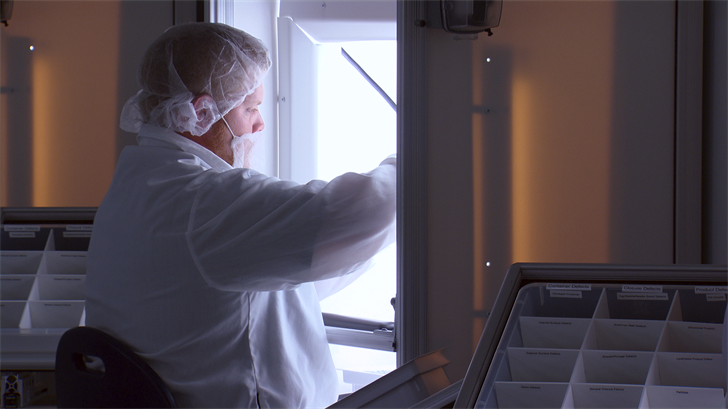300 Vials Per Minute: The Pace of Progress for Catalent
 A Catalent employee inspects a vial.
A Catalent employee inspects a vial.
Subscriber Benefit
As a subscriber you can listen to articles at work, in the car, or while you work out. Subscribe NowJust 18 months after entering Indiana’s life sciences landscape, Catalent says the “red hot” biologics sector is driving the company’s repeated large investments in Bloomington. Catalent, a contract development and manufacturing organization, does business with 41 of the top 50 biotechnology companies globally. As one of Catalent’s two nerve centers for biologics, the Bloomington site is growing at a breathtaking pace; Catalent has announced $114 million worth of investments in the operation during recent months, and executives believe there could be more.
“Our site in Bloomington may require even further investment in future years to keep up with ongoing demand,” says Bernie Clark, vice president of marketing and strategy for biologics and specialty drug delivery at Catalent.
The global company, based in New Jersey, generated $2.5 billion in annual revenue in fiscal 2018. Clark says biologics is one of the fastest growing markets in pharmaceuticals and drug development, and the Bloomington facility—which Catalent acquired from homegrown Cook Pharmica in 2017—focuses solely on this cutting-edge area of medicine.
Biologics—such as vaccines, gene therapy and tissues—demand state-of-the-art technology due to their highly sensitive and complex nature. Unlike conventional drugs with simpler structures that are produced by chemical reaction, biologics may be living organisms, such as cells and tissues.
“[Biologics] are not your typical over-the-counter tablet; these are very advanced medicines, typically focused on difficult-to-treat diseases and illnesses, ranging from cancer to cardiovascular and infectious disease,” says Clark.
Noting “there weren’t too many facilities quite like Bloomington” in the U.S., company leaders knew the high-tech operation would be up to the task when it acquired the location from Cook Pharmica.
“At Bloomington, in particular, we work on some of the most innovative molecules, starting with cell line development,” says Clark. “We help our customers grow products inside bioreactors at high volumes before taking the purified byproducts of those cells and filling them into liquid dose forms—sterile injectables, such as vials and syringes—and finally, packaging and labeling them for distribution to patients around the globe.”
Catalent recently announced it’s pumping $100 million into the plant to meet growing demand for biologics. The plans come on the heels of an earlier announcement to invest $14 million to ramp up packaging capabilities. A new high-speed line will fill 300 vials per minute, as well as a syringe/cartridge line that will operate at the same mind-boggling pace.
The increased volume is needed for the growing operation; in the 18 months since Catalent acquired the facility, it has expanded production from 12 commercial products to 20—a 66 percent increase.
“More than capital, people are fundamental to making that growth a success,” says Clark. “We have dozens of job openings today, and we’ll be hiring hundreds in the coming years to ramp up our operations and deliver for our customers.”
Catalent believes Bloomington’s pocket of life sciences companies, plus the proximity of Indiana University and Indianapolis, will meet its appetite for workers. Additionally, the state’s talent and workforce development initiative Ascend Indiana is working with Catalent and a handful of higher education partners to launch a project that will expand the pool of line operators for the Bloomington facility.
“To fill the magnitude of positions we’ll have open in the coming years, it’s going to take employees of all skill levels and backgrounds, from packaging and operations to lab science, to quality and engineering—across the board,” says Clark.
Of the seven U.S. facilities that comprise its biologic division, Bloomington is one of only two getting a $100 million dose of capital—the perfect medicine, says Catalent, to support the boom in biologics.
Clark says several factors are contributing to the “red hot” nature of the biologics sector.
Clark says production at the Bloomington facility relies on high-tech bioreactors.
